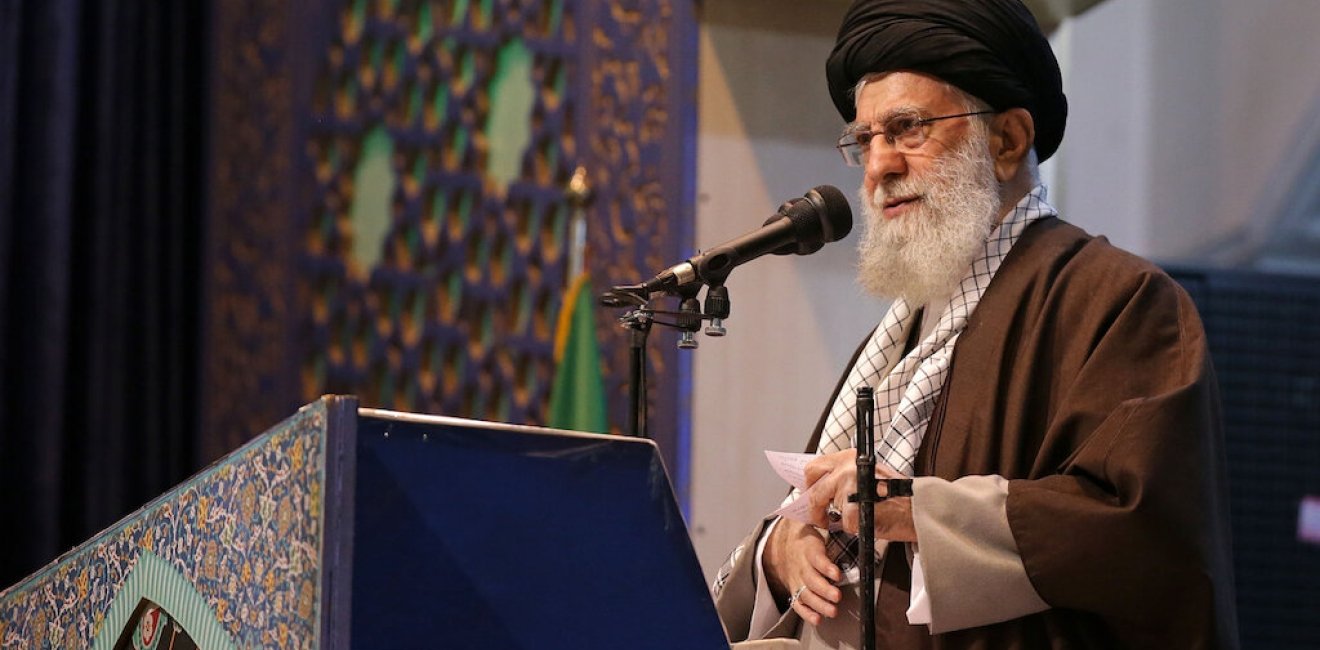For the first time in eight years, Iran’s Supreme leader, Ayatollah Ali Khamenei, personally delivered the Friday prayer sermon in Tehran this week, at a moment of rising discontent and protests at home, and confrontation with the United States and fraying relations with European states abroad. Khamenei’s uncompromisingly harsh tone dashed any expectation he would seek to ease tensions abroad or address discontent and grievances at home.
His sermon came in the wake of the Trump Administration’s killing of Qassem Soleimani, the commander of the Iran’s Quds Force and the architect of Iran’s expanding influence and militia forces in Iraq, Syria and Lebanon; Iranian retaliation by missile strikes against two military bases in Iraq where American forces are housed; and the accidental downing last week of a Ukrainian passenger plane in which all 176 passengers and crew were killed.
The airline disaster, for which Iran initially denied any responsibility, led to widespread condemnation abroad and to serious protests and demonstrations at home by Iranians enraged by the needless death of dozens of young Iranians and others by the air arm of the Revolutionary Guard; by the evidence of government incompetence; and the government’s lies and deception immediately following the crash of the Ukrainian airliner. In slogans, demonstrators called on the Supreme Leader to resign, implicitly criticized the Revolutionary Guard for its role, and expressed their general discontent with the government.
Khamenei’s response in the face of these developments was once again to concede nothing.
Khamenei’s response in the face of these developments was once again to concede nothing. The Trump Administration justified the killing of Soleimani by labeling him a terrorist and responsible for the deaths of hundreds of Americans. Khamenei described him as a hero and cited the massive crowds that mourning his passing in Iran and Iraq as evidence not only of this popularity but also as a demonstration of God’s grace and power. The Iranian missile strike against the US and military bases in Iraq “a blow to the dignity and awe of the US as a superpower.”
The US and American commentators condemn the Quds Force for sowing mayhem and interfering in the internal affairs of countries in the Middle East. To Khamenei it is a force with “lofty, humane goals” and a protector of the dignity of the oppressed. President Trump’s recent efforts to reach out directly to the Iranian people and his claim that he is on their side, is a lie, and only “to stab them in the heart with venomous daggers.”
Khamenei made no effort to maintain a modicum of goodwill with the European powers, who have tried to save the JCPOA, the nuclear agreement between Iran and the world powers and from which President Trump withdrew. He described Britain, France, and Germany as America’s “footmen” for their recent decision (reportedly under US pressure) to trigger a dispute resolution mechanism in the JCPOA, possibly triggering European sanctions for Iranian violation of the agreement; and he condemned them for supporting Iraq’s Saddam Hussein during the Iran-Iraq war and supplying him with fighter aircraft and chemical weapons.
More striking was Khamenei’s failure to address the grievances of the Iranian people who in demonstrations last week and last November voiced their frustration with high prices, joblessness, misgovernment and clerical rule...
More striking was Khamenei’s failure to address the grievances of the Iranian people who in demonstrations last week and last November voiced their frustration with high prices, joblessness, misgovernment and clerical rule in general and with Khamenei himself and with the careless downing of the Ukrainian aircraft. He expressed sympathy for the casualties of the crash 45 minutes into his sermon and only in passing. He condemned last week’s demonstrators as stooges of the US; and made no reference to the evidence of deep public discontent. His comments could be construed as a green light to the security agencies to go after the protesters, as they have done in the past.
All this is vintage Khamenei. He has long believed that the display of weakness under pressure, whether foreign or domestic, is a mistake. He has witnessed too many examples of swelling popular demonstrations leading to the fall of regimes in the former Soviet republics and in the Arab world to countenance or tolerate protest demonstrations in his own country. Even today, ten years after their initial arrest, two opposition leaders remain under house arrest for the temerity of encouraging the people to come out into the streets to mark the one-year anniversary of protests against a rigged election in 2009.
If Khamenei’s sermon is indicative of the regime’s policy going forward in face of discontent at home and tension abroad, then we can expect Iran to hunker down; to avoid concessions abroad and reform at home.
The views expressed in this article are those of the author and do not reflect an official position of the Wilson Center.
Author


Middle East Program
The Wilson Center’s Middle East Program serves as a crucial resource for the policymaking community and beyond, providing analyses and research that helps inform US foreign policymaking, stimulates public debate, and expands knowledge about issues in the wider Middle East and North Africa (MENA) region. Read more

Explore More
Browse Insights & Analysis
MENA360°

Promoting Convergence in US-Brazil Relations

360° View of How Southeast Asia Can Attract More FDI in Chips and AI

